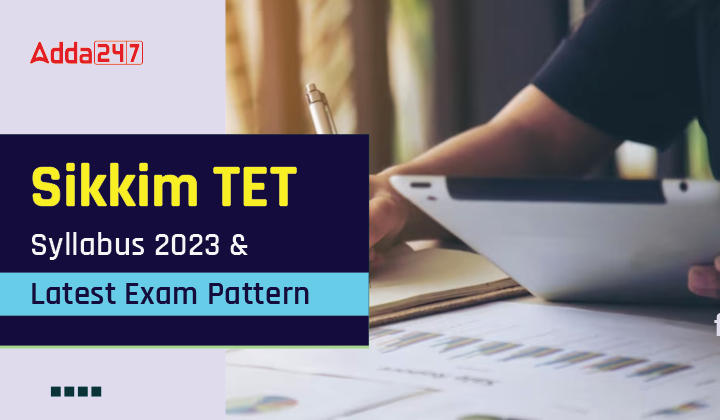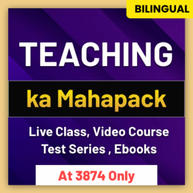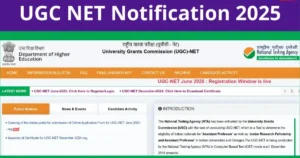Table of Contents
Sikkim TET Syllabus 2023: Sikkim Education Department is the conducting body of the Sikkim TET Exam. The Sikkim TET is also known as Sikkim Teacher Eligibility Test. In order to pass the TET examination, students must go through the Sikkim TET syllabus and study the important topics to be asked in the exam.
The in-depth knowledge of the syllabus will help you qualify TET with high marks increasing your chances of selection. Here we are providing you exam pattern and Sikkim TET syllabus 2023 which will help you in better preparation for the Sikkim TET exam.
Sikkim TET 2023 Exam Pattern
The Sikkim TET Exam consists of two papers i. e. Paper-I for Primary Teacher for Classes I to V. The Sikkim TET Exam 2023 questions will be objective in nature. Each question carries one marks and there is no negative marking in the Sikkim TET Exam 2023. There will be 150 Questions for 150 Marks in the Sikkim TET Written Test 2023. The Sikkim TET Exam 2023 will be conducted for 2 hours 30 minutes.
| Sikkim TET Syllabus 2023 | |||||
| Paper | Name of Subject | No.Of Questions | Paper | Name of Subject | Number of Questions |
| PAPER I | Child Development and Pedagogy | 30 | PAPER II | Child Development and Pedagogy | 30 |
| Language I (compulsory) and Subject concerned Pedagogy | 30 | Language I (compulsory) and Subject concerned Pedagogy | 30 | ||
| Language II (compulsory) and Subject concerned Pedagogy | 30 | Language II (compulsory) and Subject concerned Pedagogy | 30 | ||
| Mathematics and Subject concerned Pedagogy | 30 | Mathematics & Science and Subject concerned Pedagogy OR Social Studies/Social Science and Subject concerned Pedagogy |
60 | ||
| Environmental Studies and Subject concerned Pedagogy | 30 | ||||
| Total Marks | 150 | Total Marks | 150 | ||
| Negative marking | No | Negative marking | No | ||
Note:
Sikkim TET 2023 Syllabus
Sikkim TET Syllabus 2023 is different for Primary & upper Primary Level. Candidates must go through the topic wise syllabus before starting their preparation. The syllabus is available in the PDF format for all different subjects given below.
Sikkim TET Syllabus Paper I
(A) Child Development (Primary School Child)
- Concept of development and its relationship with learning.
- Principles of the development of children.
- Gross and fine motor development skills in infancy & preschool children.
- Socialization processes: Social world & children (Teachers, parents, peers.)
- Piaget, Kohlberg and Vygotsky: constructs and critical perspectives.
- Development of speech and language.
- Gender as a social construct; gender roles, gender – bias and educational practice.
- Individual differences among learners, understanding differences based on diversity of language, caste, gender, community, religion etc.
- Understanding child abuse.
(B) Concept of Inclusive education and understanding children with special needs.
- Addressing learners from diverse backgrounds including disadvantaged and deprived.
- Addressing the needs of children with learning difficulties, impairment etc.
- Addressing the talented, creative, especially able learners.
(C) Learning and Pedagogy
- How children think and learn.
- Factors contributing to learning –personal & environmental.
- Basic processes of teaching and learning; children’s strategies of learning; learning as a social activity; social context of learning.
- Cognition & Emotional development of child.
- Motivation – Concept and types of Motivation; Relationship between Motivation and Learning.
- Gathering data about children from different context: Naturalist Observation, Reflective Journal, and Anecdotal Record.
Sikkim TET Syllabus 2023 Language Wise
(A) Language Comprehension
Reading unseen passages – two passages one prose or drama and poem with questions on comprehension, inference, grammar and verbal ability ( Prose passage may be literary, scientific, narrative or discursive )
(B) Pedagogy of Language Development
- Learning and Acquisition
- Principles of language Teaching
- Role of listening and speaking; function of language and how children use it as a tool
- Critical perspective on the role of grammar in learning a language for communicating ideas verbally and in written form;
- Challenges of teaching language in a diverse classroom; language difficulties, errors and disorders
- Language Skills
- Evaluating language comprehension and proficiency: speaking, listening, reading and writing
- Teaching – learning materials: Textbook, multi – media materials, multilingual resource of the classroom
- Remedial Teaching
Sikkim TET Syllabus 2023 Mathematics
(A) Content
1. Numbers
- Squares and Square roots
- Cubes and Cube roots
- Integers
- Decimals and Fractions
- Algebraic Expressions and Identities
- Factorizations
- Rational Numbers
- Exponents and Powers
- Addition and Subtraction
- Operation on Numbers
- Ratio and proportion
- Measurement
- Comparing Quantities
- Direct and Inverse Variations
- Geometry
- Shapes & Spatial Understanding
- Solids around Us
- Mensuration
- Weight
- Data Handling
- Patterns
- Money
(B) Pedagogical Issues:
- Nature of Mathematics/Logical thinking; understanding children’s thinking and reasoning patterns and strategies of making meaning and learning
- Place of Mathematics in Curriculum
- Language of Mathematics
- Community Mathematics
- Evaluation through formal and informal methods
- Problems of Teaching
- Error analysis and related aspects of learning and teaching
- Diagnostic and Remedial Teaching
Sikkim TET Syllabus 2023 Environmental Studies
(A) Content
(i) Science: VI-VIII
- Food: Sources and Components
- Nutrition in Plants and Animals
- Light, Shadows and Reflection
- Electric Current and its effects
- Sound
- Microorganism: Friend and Foe
- Pollution of Air and Water
- Physical and Chemical changes
- Fibre to Fabric
(ii) Social Science: (VI-VIII Social and Political Life, History–Our Pasts, Geography)
(a) History:
- From Gathering to Growing Food
- Rulers and Buildings
- India after Independence
(b) Geography:
- Motions of the Earth
- Life in the Temperate Grassland
- Mineral and Power Resources.
(c) Social and Political Life:
- Diversity and Discrimination.
- Understanding Media.
- Understanding Marginalisation
(B) Pedagogical Issues:
- Environmental Studies: Meaning and Nature.
- Objectives of teaching Environmental studies.
- Approaches to teaching Environmental Studies. NCF – 2005
- Meaning of Child Centric activity-based classroom.
- Principles and importance of Child-Centred approach.
- Needs of the child.
- Development of various skills among the children through teaching of Environmental studies.
- Steps in planning and conducting activities.
- Methods of teaching environmental studies – Meaning, importance, advantages and disadvantages.
- Difference between various methods of teaching.
- Methods of teaching at Primary Level.
- Problem solving method.
- Question answer method or conversation method.
- Project method
- Play – way method
- Story telling method
- Scientific method
- Principles and Characteristics of good method of teaching.
- Different types of activities needed to develop various skills among the children.
- Teaching – Learning material –Meaning, Importance, Qualities of teaching–Learning material, Types – Audio, Visual, Audio – Visual
- Meaning, importance, principles of lesson plan.
- Steps involved in Lesson Planning.
- Continuous and Comprehensive Evaluation:
- Difference between Assessment and Evaluation, importance of evaluation.
- Types of assessment – Formative and Summative
- Tools and Techniques of Evaluation (Summative Assessment)
- Types of questions, Qualities of a good question paper. Educational objectives for framing questions (According to NCERT Model.)
- Grading System at Primary level – Meaning, Type of grading.
Sikkim TET 2023Detailed Syllabus: [Paper II]
⇒Sikkim TET Syllabus 2023 Child Development and Pedagogy
(A) Child Development (Elementary School Child)
- Concept of development and its relationship with learning
- Principles of development of children
- Influence of Heredity and Environment
- Socialization processes: Social world and children (Teacher, parents, peers)
- Piaget, Kohlberg and Vygotsky: constructs and critical perspectives
- Concepts of child – centered and progressive education
- Critical perspective of the construct and intelligence
- Multiple Intelligence
- Language and Thought
- Gender as a social construct: gender roles, gender – bias and education practice
- Individual differences among learners, understanding differences based on diversity of language, caste, gender, community, religion
- Data organization, Graphical representation (Bar Diagram, Histogram, Frequency Polygon, Ogive, Pie and Line Graph), Mean, Mode, Median, Standard Deviation, Average Deviation, Quartile Deviation, Percentiles and Ratio
- Principles of constructing Objective, short answer, essay and Interpretative type
- Characteristic of good test: Reliability, Validity, Objectivity and Usability.
(B) Concept of Inclusive education and understanding children with special needs
- Addressing learners from diverse backgrounds including disadvantage and deprived.
- Addressing the needs of children with learning difficulties and impairment.
- Addressing the Talented, Creative, Especially abled Learners.
- Mental Health and Mental Hygiene: Concept, causes and remedial Measures.
(C) Learning and Pedagogy
- How children think and learn: how and why children fail to achieve success in school performance.
- Basic process of teaching and learning: children’s strategies of learning and a social activity: social context of learning.
- Child as a problem solver and a scientific investigator.
- Alternative conceptions of learning in children, understanding children’s errors as significant steps in the learning process.
- Cognition and Emotions.
- Motivation and learning.
- Factors contributing to learning – personal and environmental.
- Personality – Types.
- Constructivism and learning.
⇒Sikkim TET Syllabus 2023 Language
(A) Language Comprehension
Two unseen prose passages(discursive or literary or narrative or scientific)with question on comprehension, grammar and verbal ability.
(B) Pedagogy of Language Development
- Learning and Acquisition
- Principles of language Teaching
- Role of listening and speaking; function of language and how children use it as a tool
- Critical perspective on the role of grammar in learning a language for communicating ideas verbally and in written form;
- Challenges of teaching language in a diverse classroom; language difficulties, errors and disorders
- Language Skills
- Evaluating language comprehension and proficiency: speaking, listening, reading and writing
- Teaching – learning materials: Textbook, multi – media materials, multilingual resource of the classroom
- Remedial Teaching
⇒Sikkim TET Syllabus 2023 Mathematics
- Content
(i) Number System
- Knowing our Numbers
- Playing with Numbers
- Whole Numbers
- Real Numbers
- Fractions
(ii) Algebra
- Introduction to Algebra
- Polynomials
- Remainder Theorem
- Linear Equations up – to two variables
- Ratio and Proportion
- Quadratic Equations
(iii) Arithmetic Progressions
(iv) Introduction to Trigonometry
- Trigonometric Ratios
- Trigonometric ratios of some specific angles
- Trigonometric Ratios of Complimentary Angles
- Trigonometric Identities
(v) Some Applications of Trigonometry
- Heights and Distances
(vi) Geometry
- Basic geometrical ideas (2 – D)
- Lines and Angles
- Triangles, Polygons and Circles
- Understanding Elementary Shapes (2 – D and 3 – D)
- Symmetry: (reflection)
(vii) Mensuration
- Surface Area and volumes of cube, cuboid, right circular cylinder, right circular cone, hemisphere and Sphere.
(viii) Coordinate Geometry
(ix) Data handling
- Pictorial Representation of Data
- Mean, Median and Mode of Grouped and Ungrouped Data
- Probability
Pedagogical Issues:
- Nature of Mathematics/Logical thinking
- Place of Mathematics in Curriculum
- Language of Mathematics
- Community Mathematics
- Evaluation
- Remedial Teaching
- Problem of Teaching
⇒Sikkim TET Syllabus 2023 Science
(A) Content:
- Motion
- Velocity
- Acceleration
- circular motion
- Force and laws of motion
- Gravitation
- Work and energy
- Sound – its speed and characteristics
- Light
- Reflection
- Refraction
- Human eye
- Electricity
- Ohm’s law
- Resistance
- Magnetic effect of current
- Air
- Materials from daily life
- Metals and non – metals
- Acid ,base and salt
- Carbon and its compounds
- Atoms and molecules
- Structure of the atom
- Periodic classification of elements
- Basic chemical reactions and equations
- Water
- Physiological processes in plants and animals
- Respiration
- Transportation
- Reproduction
- Cell – structure and functions
- Tissue – structure and functions
- Forest
- Environment
- Natural resources
- Control and coordination
Pedagogical Issues:
- Nature and Structure of Science
- Aims of Objectives
- Correlation with other subject i.e. Physics, Chemistry and Biology.
- Scientific method and inquiry.
- Science Curriculum
- Recommendation of NCF 2005 on teaching of Science.
- Approaches & Methods of teaching Science.
- Planning and Learning Resources for effective instruction in Science.
- Unit plan, Lesson Plan & TLMs.
- Community & Laboratory as a learning Resources.
- Evaluation of Learner progress
- Tools & Techniques for assessment in Science.
- Diagnostic & Remedial Teaching in Science.




 UGC NET Notification 2025 Out, Exam Date...
UGC NET Notification 2025 Out, Exam Date...
 Last Minute Preparation Tips for MP TET ...
Last Minute Preparation Tips for MP TET ...
 GAT B Cut Off 2025, Check Expected, Cate...
GAT B Cut Off 2025, Check Expected, Cate...














